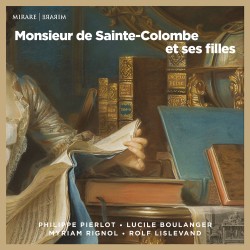 Monsieur de Sainte-Colombe et ses filles
Monsieur de Sainte-Colombe et ses filles
Lucile Boulanger; Rolf Lislevand; Myriam Rignol; Philippe Pierlot
Mirare MIR336 (mirare.fr/album)
Other than being slightly aware that there had been a brief renaissance of the music of Monsieur de Sainte-Colombe (Jean de Sainte- Colombe 1640-1700) during the 1990s, I knew little about the French composer and celebrated violist, prior to picking up this fine recording. I am glad that I did, however. Recorded beautifully in the Chapel of the Immaculate Conception in Nantes, the church’s gorgeous acoustics become a welcome fifth member of the consort of Philippe Pierlot, Lucile Boulanger and Myriam Rignol, all on viola de gamba, along with theorbist Rolf Lislevand, to faithfully recreate and capture the nuance and intimacy of this still-popular musical form.
Listening to the 17th-century music of Sainte-Colombe, along with complementary pieces by Louis Couperin, Jacques Champion de Chambonnières and Robert de Visée during Lockdown 2020 can, I suppose, feel somewhat anachronistic, if not downright discordant from the realities that we are all dealing with on a daily basis. But if it is possible for you to do so, the opportunity to disconnect and to immerse yourself in the listening pleasure of this straight-forward, well-played and conversational music is there for you here. Perhaps most meaningfully, the realities of COVID-19 have forced many of us to potentially re-evaluate friendships, reconnect (or make amends), realizing that life is valuable and, sadly, short. Always, perhaps, but seeming to be particularly so during this time of widespread illness and loss. Accordingly, Sainte-Colombe’s Tombeau Les Regrets, performed beautifully here, offers an opportunity for listeners to contemplate and “meditate upon death,” allowing the Stoic edict Memento Mori (“remember that you will die”), to be not a morbid reality check, but rather to remind us all to love, live and listen, fully and completely. A valuable lesson to be sure, and one, perhaps, that the beauty of early music can teach us today.



